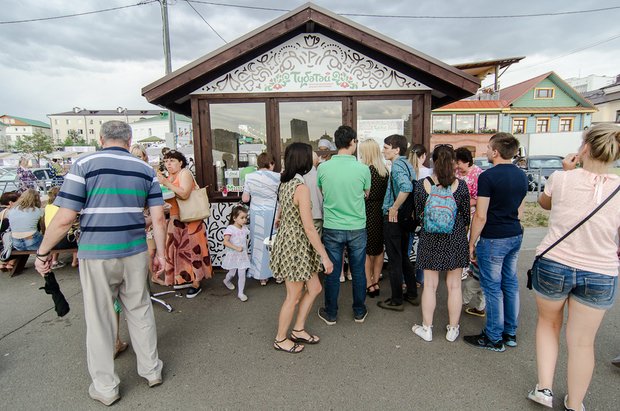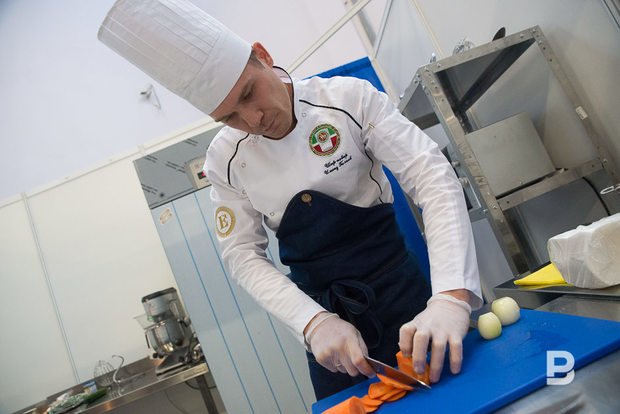Igor Bukharov: 'Once businesses were robbed by bandits, now it is the state who is trying to do it'
President of the Federation of Restaurateurs and Hoteliers of Russia Igor Bukharov about the results of the World Cup for businesses and the problems in the hospitality industry
How did restaurateurs and hoteliers 'survive' the recently finished World Cup and who made money on it? Why is there still pressure on the restaurant business in Russia and who exerts it if the bandits remained in the distant '90s? Will marketing tricks help your business if your cooks never learned to fry meatballs? President of the Federation of Restaurateurs and Hoteliers of Russia, publisher of the magazine Vinomania Igor Bukharov answered these and other questions in the interview with Realnoe Vremya.
'The concept of 'bread and circuses' should be realised without much cynicism'
Mr Bukharov, not so long ago you have come to Kazan for the annual summer campus of Ranepa, within the framework of which entrepreneurship in the field of culture and entertainment was discussed. In your opinion, how important is this issue in the economy today? Is it timely to discuss it with students?
First of all, the world is changing. If you do not understand what is going to be promising in the near future, or if your parents did not tell you, then there is a great risk to find yourself not in the most favourable situation. Plus, you should always keep in mind that over four years you are studying at university, there may appear absolutely new demanded professions in the world in which you will not understand anything at all.
Second, culture is very important for the development of personality. In order to make culture exist, it should support itself somehow. Let's take, for example, architecture: initially, someone invested in the construction of buildings, which were eventually evaluated as cultural heritage. Plus, funds for restoration, maintenance are required, but where to get them from?
For example, museums: the paintings that are presented there previously were purchased for a lot of money, and today they belong to the whole society. Again, the maintenance (paintings or sculpture require special conditions) requires funds. I'm not saying that museums should be fully switched to self-sufficiency, but they should at least strive to obtain additional income. Therefore, in my opinion, entrepreneurship in the field of culture is very important.
Let's move on to entertainment: what is it? This is also part of national culture. Let's take Sabantuy — the holiday of plow. People sowed and then celebrated. In order to continue this tradition to this day, it is necessary to have an understanding of how to hold this holiday — how to make sure that it is repaid somehow.

''Let's move on to entertainment: what is it? This is also part of national culture. Let's take Sabantuy — the holiday of plow. People sowed and then celebrated. In order to continue this tradition to this day, it is necessary to have an understanding of how to hold this holiday.'' Photo: Oleg Tikhonov
The approach turns out to be utilitarian a little…
Just to clarify, I am against a very utilitarian approach, but getting an income at least additional — it is very important. This is also important for local authorities because they have the opportunity to direct tax money to some other important things. If you look at the experience of the United States, the same Las Vegas, as an entertainment centre, brings a certain profit, which they were able to turn into their income. We should learn from them. But the concept of 'bread and circuses' should be implemented without much cynicism.
Again, we need to learn this. If you do not understand the technology, if you do not know how to arrange a holiday so that it is convenient, not expensive and that participants can earn on it, then most likely you are doomed to failure. This should be taken seriously and we should learn how to do it.
''If you come to check a company, the fine should be at least 200,000 rubles''
I cannot but ask you as the president of the Federation of Restaurateurs and Hoteliers of Russia about how this business segment has 'survived' the recently finished World Cup. What is the result for the hospitality industry?
I can't tell for sure that all tens of thousands of companies existing in our country made money on the championship. Mostly those who were in the epicentre of the events did it. Let's take Kazan and Bauman Street: your 'Arbat' really attracted people, and all the restaurants that are located there – they made money. Those that are located a little further — earned less. Restaurants in more remote places attracted guests only if they guessed to put TVs and broadcasted matches.
By the way, during a recent visit to Kazan, we met with colleagues from the Association of Restaurateurs and Hoteliers of Tatarstan. At the meeting, Zufar Gayazov (Chairman of the Association of Restaurateurs of Tatarstan – editor's note) said that he completed the construction of the most part of the Tatar Usadba, but if the first part of it was visited by all the guests, then further — few guests went there. People just needed to eat and go. People did not have any special preferences.

''Zufar Gayazov said that thye completed the construction of the most part of the Tatar Usadba, but if the first part of it was visited by all the guests, then further — few people came. People just needed to eat and go.'' Photo: Oleg Tikhonov
As for the occupancy of the hotels, the situation here is as follows: someone rented a room in a five-star hotel, someone lived in a hostel, and someone in an apartment. Everyone earned to some extent, but then there is the question of how much they spent on bringing businesses in line with the requirements.
In total, all this has a very positive impact on the hospitality industry — the level of hotels and restaurants has increased significantly. So, even if you have not earned in this championship, you should understand that now the level of your business has become much higher. This is very important in the context of that after the World Cup our country is known to everyone around the world, and foreigners will definitely come to us again.
What problems did the restaurant and hotel business have before the World Cup? And what problems do still remain in this area, despite the increase in overall level?
The first and most important problem is personnel. The second problem is knowledge. Today, vast majority of people coming to hospitality industry simply do not have the knowledge that would allow them to stay afloat in this market, to be in the black and work steadily. For this reason, we often see how after investing in business, a huge number of restaurants and hotels in the first year become bankrupt or are rented.
We have a serious problem in the area of training specialists: tell me, who are these people, who teach modern students to work in our industry? The most acute problem is the lack of teachers in this area.
Mr Bukharov, what about external problems? With the pressure on the restaurant business? Last year alone we observed several high-profile stories: with the same Fyodor Ovchinnikov and Sergey Mironov…
Unfortunately, such things really exist. We have not developed means of control and supervision. In Russia, there are a large number of rules, which do not concern the quality of products or the quality of services — they are written in order, for example, to fine a company.
Did you see that Boris Titov (Commissioner for the President of the Russian Federation on the Rights of Entrepreneurs – editor's note) published on his Facebook page the order of the Ministry of Labor of Novosibirsk Oblast, which says literally the following: if you come to inspect a company, the fine should be at least 200,000 rubles? You see, this is another way for the state to get cash flow (which then remains in local budget) in addition to taxes. In other words, it is a means of the state to receive more money. Once they were robbed by bandits, but now it is the state who is trying to do it.

''In Russia, there are a large number of rules, which do not concern the quality of products or the quality of services — they are written in order, for example, to fine a company.'' Photo: Maksim Platonov
There is also another important point. Even when our entrepreneurs are told, ''Well, we will inspect you less'', they do not understand that this does not exempt them from the implementation of the law on compliance with sanitary and epidemiological norms or fire safety. Therefore, things such as the Lame Horse fire or Winter Cherry fire in Kemerovo happen.
''Stop doing marketing — learn how to fry meatballs''
I would like to ask you about the restaurant business: is there oversaturation in the Russian market? Do you feel that, in order to really 'take off', now you need to be as sophisticated as possible with the concept, menu, etc.?
As for oversaturation, I can't agree with you — just take any country where there are 2-3 times more restaurants and cafes than we have. If you come to the same America, you will find there about a million burger places… The question is what exactly restaurateurs do and what concepts they offer to guests.
Ok, open a burger place — go ahead, try. But you don't have to do something 'out of the ordinary' with the given competition. You just should make cheaper and better. You don't have to invent anything supernatural. You don't have to import products because the logistics shoulder will eat up all your profits. Work properly: put the right equipment, make a menu that does not need a super chef who has to be paid a lot of money.
Sign the right contract for yourself with the landlord — do not get into bondage. People often agree for it, and then comes the time ''Ooops, it did not work out'' or ''Oops, I spent so much money and now I cannot return them — let someone bought it''. But no one wants to buy!

''You don't have to do something 'out of the ordinary' with the given competition. You just should make cheaper and better. You don't have to invent anything supernatural.'' Photo: Maksim Platonov
Mr Bukharov, with all that you have said, how important is the marketing component today? Many are trying to invent some interesting tricks (the same Sergei Mironov came up with the idea to attract people with free lunch for repost of his posts on Facebook, for example) and they seriously rely on it…
Stop doing marketing — learn how to fry meatballs. That's it! It should be normal food — this is the main thing.